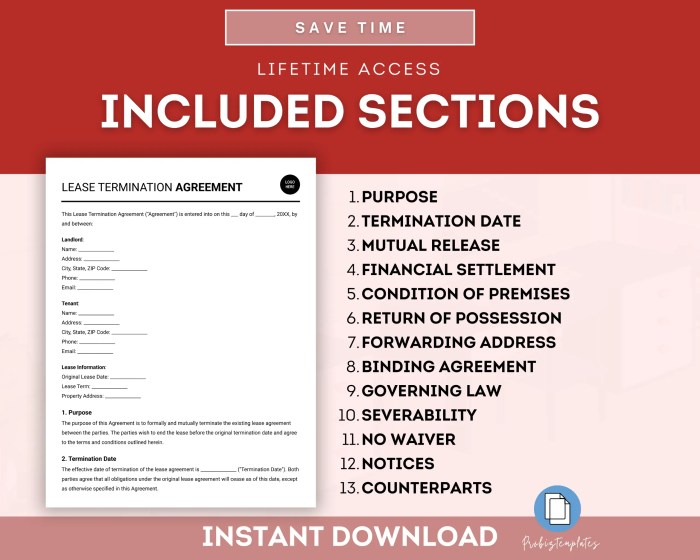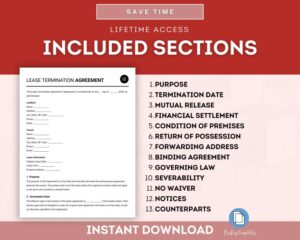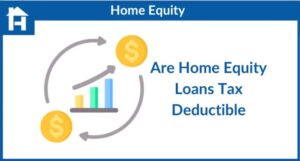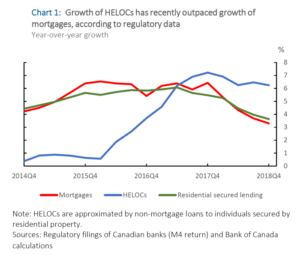
Welcome to the whimsical world of Lease termination, where legalese meets life choices and landlords can sometimes feel like ancient gatekeepers guarding their treasures! Picture this: you’ve decided it’s time to break free from your lease like a bird escaping its cage, but oh, the complexities await! Here, we’ll untangle the legal knots, decipher the notice periods required, and explore the impact on both tenants flying away and landlords clutching their pearls.
As we dive deeper, we’ll also unearth the financial implications lurking beneath the surface. How does lease termination affect your credit score? What hidden costs might pop up like uninvited guests at a party? And fear not, we’ll even throw in some pro tips on credit counseling to keep your financial ship sailing smoothly, even amidst the storm of lease termination!
Understanding Lease Termination

When it comes to lease termination, the process can feel like navigating a labyrinth filled with legal jargon and potential pitfalls. It’s essential for both tenants and landlords to grasp the ins and outs of this topic to avoid any unwanted surprises—or worse, legal headaches. Think of it as the final episode of a sitcom: you want it to end on a high note, not with a cliffhanger that leaves everyone scratching their heads.Understanding the legal grounds for lease termination is crucial.
Lease agreements are legally binding contracts, and breaking them can have serious repercussions. Common grounds for termination include non-payment of rent, breach of lease terms, or mutual agreement to end the lease. If a tenant has stopped paying rent, for example, landlords may have the legal grounds to terminate the lease. On the other hand, a tenant may wish to terminate the lease if the property becomes uninhabitable or if a landlord fails to meet their obligations.
Notice Periods Required for Lease Termination
Notice periods play a pivotal role in the lease termination process, acting as a formal announcement that the end is near. These timeframes vary depending on local laws and the terms Artikeld in the lease agreement. It’s not just a polite way to say goodbye; it’s a legal must-do that can save everyone from a lot of headaches.
- 30 Days Notice: Typically required in month-to-month leases. This is the standard amount of time landlords and tenants must give each other to vacate or end the tenancy.
- 60 Days Notice: Often required for longer-term leases, particularly in certain jurisdictions. This extended timeframe allows tenants ample time to secure a new place and landlords to find new tenants.
- Immediate Termination: In cases of serious breaches, such as illegal activity or significant property damage, landlords may terminate the lease immediately without prior notice.
Understanding the notice period relevant to your situation is essential to prevent any legal mishaps. Failure to provide the correct notice can lead to disputes and potential legal action.
Implications of Lease Termination for Tenants and Landlords
The implications of lease termination are like the plot twists in your favorite soap opera—full of surprises that can change the dynamics between tenants and landlords. Both parties must understand their rights and responsibilities to ensure a smooth transition.For tenants, termination can lead to several outcomes, including the need to find a new place to live quickly, the potential loss of the security deposit, or even legal disputes if the termination is contested.
Understanding the implications helps tenants plan their next moves effectively.Conversely, landlords face their own set of challenges, such as the potential loss of rental income during the vacancy period and the responsibility of returning security deposits, which can sometimes feel like a game of poker where everyone’s bluffing. They also need to keep compliance with local laws to avoid legal repercussions.
“A proper understanding of lease termination can save you from ending up in a legal quagmire. It’s like reading the fine print—nobody wants to be surprised by fees after the fact!”
Navigating lease termination may seem daunting, but understanding the legal grounds, notice periods, and implications can make the process as smooth as a well-rehearsed sitcom finale.
Financial Considerations in Lease Termination

When the time comes to bid adieu to your rental haven, it’s crucial to keep your financial eyes wide open. Lease termination can be as tricky as navigating a minefield while blindfolded, especially when it comes to your wallet. From the potential impact on your credit score to the sneaky costs lurking around every corner, here’s what you need to know to avoid an unplanned financial detour.
Impact on Credit Scores
Lease termination can cast a shadow on your credit score, much like that one friend who always seems to find themselves in awkward situations. Early termination can signal to credit agencies that you’re not a fan of commitment, which could lead to a drop in your credit score. This happens if the lease is reported as broken or if you leave any lingering balances.
Keeping a close eye on your credit report is essential; think of it as your financial diary that tells the world how responsible (or irresponsible) you’ve been.
The magic number: A drop in your credit score can range from 50 to 100 points, depending on the situation.
Costs Associated with Breaking a Lease Early
Breaking your lease early? Prepare for a potential financial hit. Various fees can come into play, making your wallet feel lighter than a feather on a windy day. Here’s a quick breakdown of costs you might encounter:
Early Termination Fee
Many leases include a fee for breaking the lease early, often equivalent to one or two months’ rent. Think of it as a final “thank you” for your landlord’s hospitality.
Lost Rent
You might be on the hook for the rent until the landlord finds a new tenant. It’s like being in a bad relationship where you still have to pay for the dinner even after the breakup.
Cleaning and Repairs
If the place looks like a tornado tore through it, expect to pay for additional cleaning or repairs beyond normal wear and tear. Your security deposit may not cover it all, and nothing says “goodbye” like a hefty bill for a missing doorknob.
Potential total costs can range from hundreds to thousands of dollars, depending on your lease terms and condition of the rental.
Impact on Debt Management Strategies
Breaking a lease impacts your debt management strategies, often requiring a quick financial re-evaluation. You may need to shift your budget around, much like a game of Tetris, to accommodate the unexpected expenses. Here’s how it can affect your financial game plan:
Increased Monthly Payments
If you find yourself needing a new place quickly, you might face higher rent prices, particularly in competitive markets.
Adjustment of Debt-to-Income Ratio
Potentially higher living costs can skew your debt-to-income ratio, making lenders hesitant when you seek new loans or credit.
Emergency Fund Erosion
Any unexpected lease termination costs can dig into your savings. This could put you at risk if an actual emergency arises, like your car deciding to retire early or a surprise medical expense.
Maintaining a solid emergency fund is crucial; experts recommend keeping at least three to six months’ worth of expenses saved up.
Navigating lease termination requires more than a casual exit; it demands a strategic approach to finances. By understanding the implications on credit scores, anticipating potential costs, and adjusting your debt management strategies, you can ease the transition and keep your financial ship sailing smoothly.
Lease Termination and Credit Counseling
When it comes to lease termination, the emotional rollercoaster is real. You’re packing your bags, your landlord is giving you the side-eye, and your credit score is just sitting there, watching all the drama unfold. Enter credit counseling, the unsung hero of financial dilemmas! They’re like the trusty sidekick in a superhero movie, helping you navigate the turbulent waters of lease termination with grace and perhaps a bit of humor.Credit counseling plays a pivotal role in lease termination by guiding individuals through the financial implications of ending a lease early.
With a skilled counselor by your side, you can dissect your current lease agreement, identify any potential penalties, and strategize on the best ways to approach your landlord. This assistance can lead to negotiating terms that not only ease the burden on your wallet but also preserve your credit score. After all, no one wants to be the villain in their own financial saga!
Negotiating Lease Termination Terms
Negotiating your lease termination terms is akin to bartering for the last slice of pizza – it requires finesse and a sprinkle of charm. Knowing how to approach these discussions can significantly reduce your financial repercussions. Here are some tips to consider when entering negotiations:
1. Gather Information
Arm yourself with knowledge about your lease terms. Understanding your rights and obligations can give you an upper hand in negotiations.
2. Be Honest and Clear
Communicate your reasons for leaving. Whether it’s a job relocation or unexpected financial hardship, being transparent can foster sympathy and potentially loosen the landlord’s grip on those punitive fees.
3. Offer Alternatives
Propose solutions that work for both parties. Perhaps you can help find a new tenant or offer to pay a portion of the remaining rent in exchange for a reduced penalty.
4. Stay Calm and Polite
Approach the conversation with a calm demeanor and a respectful tone. Remember, you catch more flies with honey than with vinegar – or so they say!
5. Document Everything
Keep a record of all communications. Written agreements can save you from future headaches and ensure everyone is on the same page.
“Negotiating is not just about getting what you want; it’s about finding a win-win solution.”
Resources for Financial Difficulties Related to Lease Termination
Facing financial difficulties due to lease termination can feel overwhelming, but there are resources available to help you weather the storm. Here’s a summary of valuable options:
Nonprofit Credit Counseling Agencies
Organizations such as the National Foundation for Credit Counseling (NFCC) offer free or low-cost services that can help you navigate your financial situation and provide personalized budgeting advice.
Legal Aid Services
If you’re facing eviction or legal issues related to your lease, local legal aid organizations can offer assistance or guidance, often at no charge.
Community Programs
Many communities have resources such as housing assistance programs or financial education workshops. Check with local nonprofits or city resources for available programs.
Online Financial Management Tools
Websites and apps like Mint or YNAB (You Need A Budget) can help you track your spending and budget effectively during this transitional period.
Emergency Funds
If you have access to savings or emergency funds, now is the time to utilize these resources wisely to cover any unexpected costs during lease termination.
“While it may feel like the end of the world, with the right resources and support, you can turn this chapter into a mere footnote in your financial story.”
Final Summary
In conclusion, navigating the maze of Lease termination doesn’t have to feel like an uphill battle against a horde of legal monsters. With the right knowledge, you can emerge victorious, whether you’re a tenant seeking freedom or a landlord aiming to protect your kingdom. Remember, being informed is your best weapon, and with a pinch of humor, you can tackle lease termination like a pro!
Answers to Common Questions
What is lease termination?
Lease termination is the process through which a rental agreement is ended, either early or at the agreed-upon end date.
How much notice do I need to give to terminate a lease?
Notice periods vary, but typically, tenants must give 30 to 60 days’ notice, depending on the lease agreement.
Will lease termination affect my credit score?
Yes, lease termination can impact your credit score, especially if you break the lease without following proper procedures.
Are there penalties for breaking a lease early?
Yes, penalties may include losing your security deposit and possibly having to pay rent until a new tenant is found.
Can I negotiate the terms of lease termination?
Absolutely! Many landlords are willing to negotiate terms, especially if you communicate openly and provide a valid reason.





